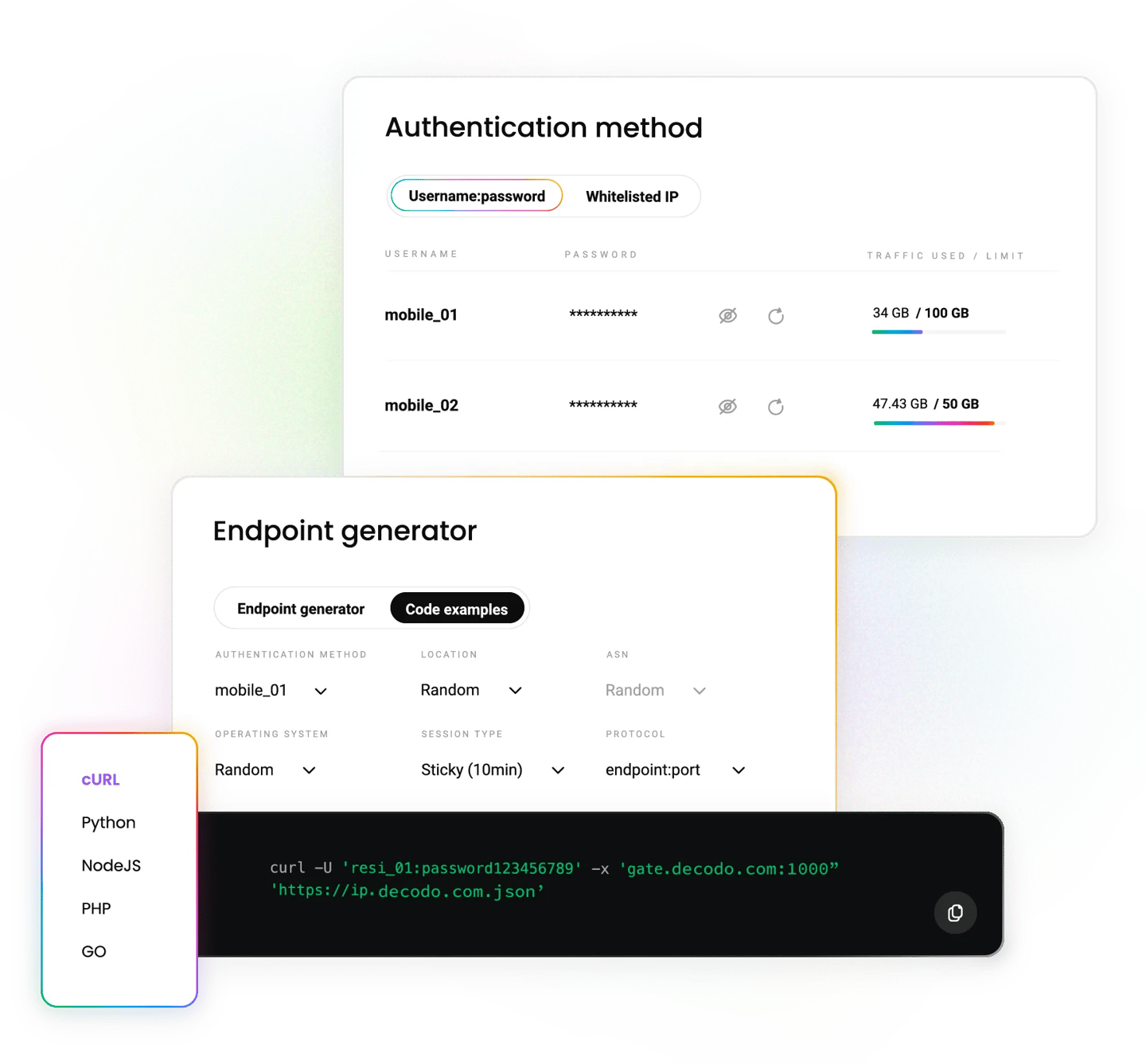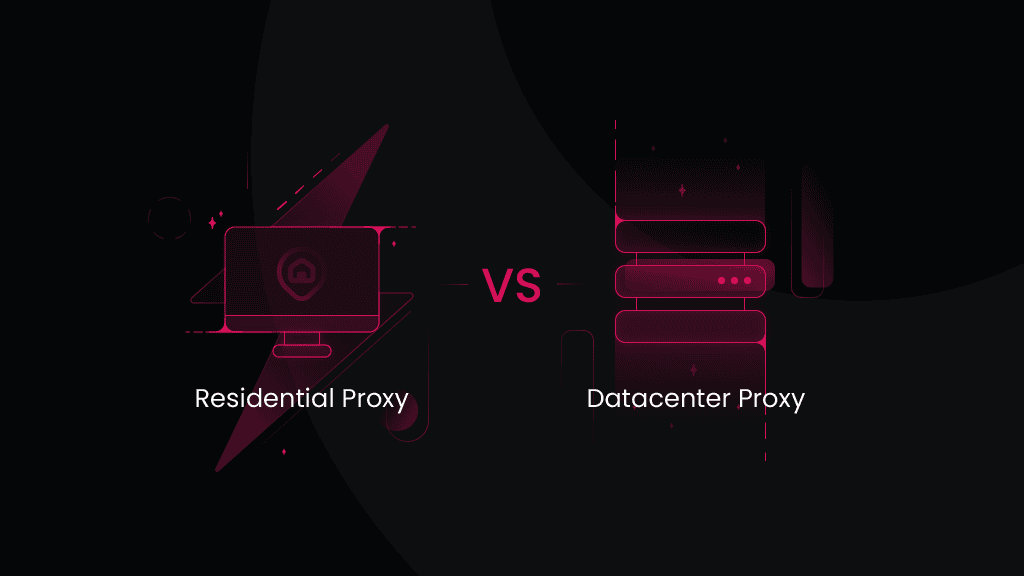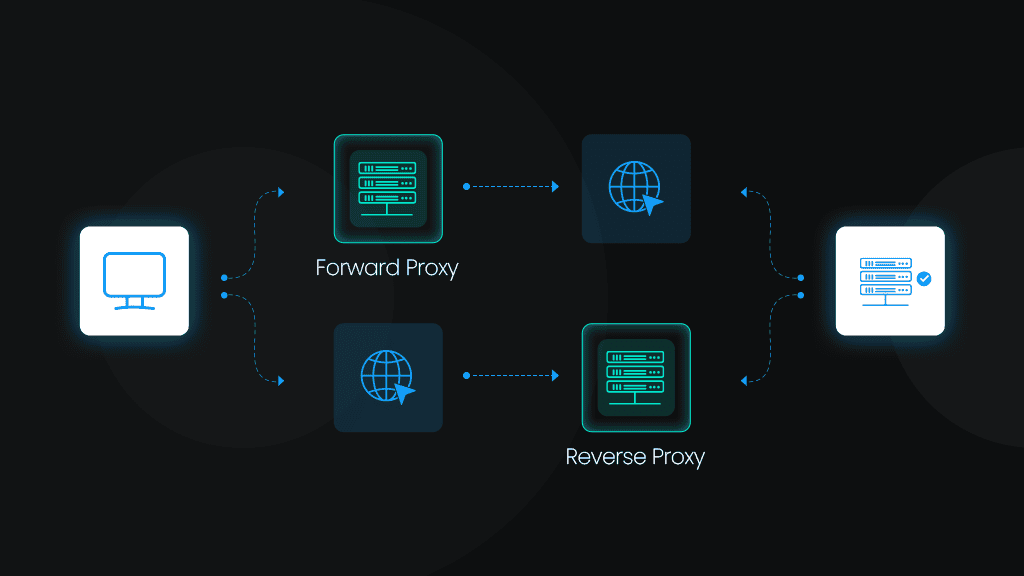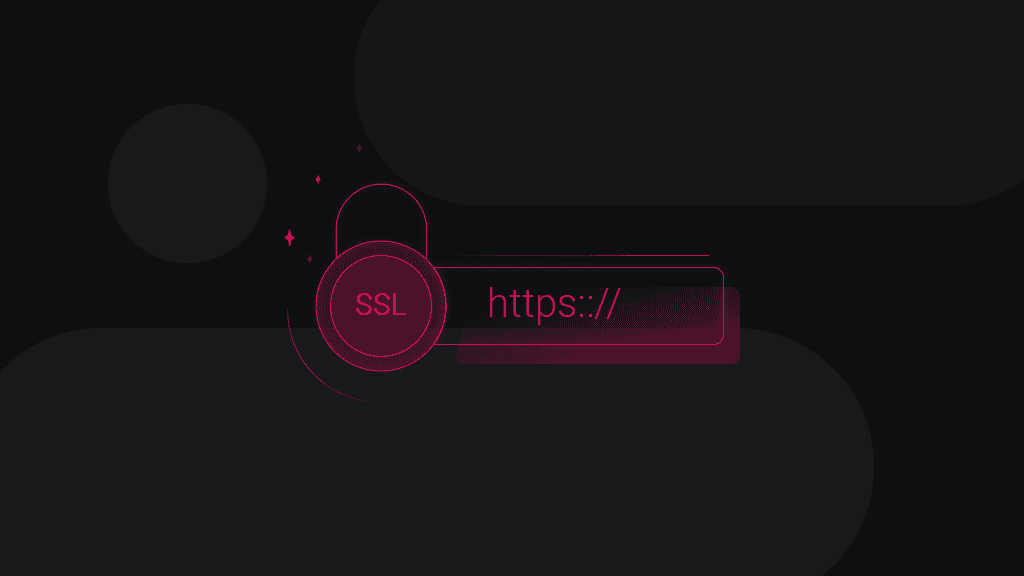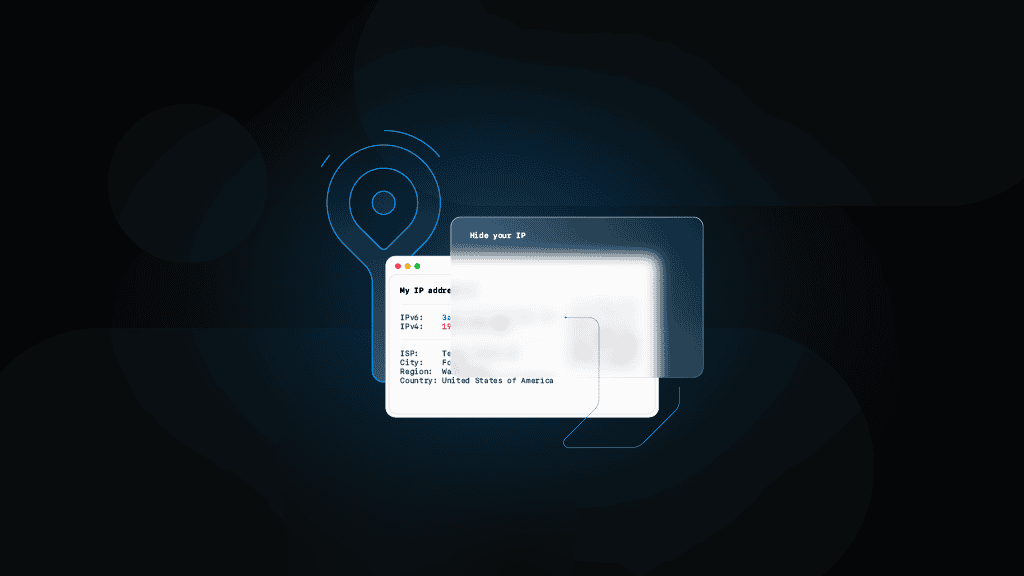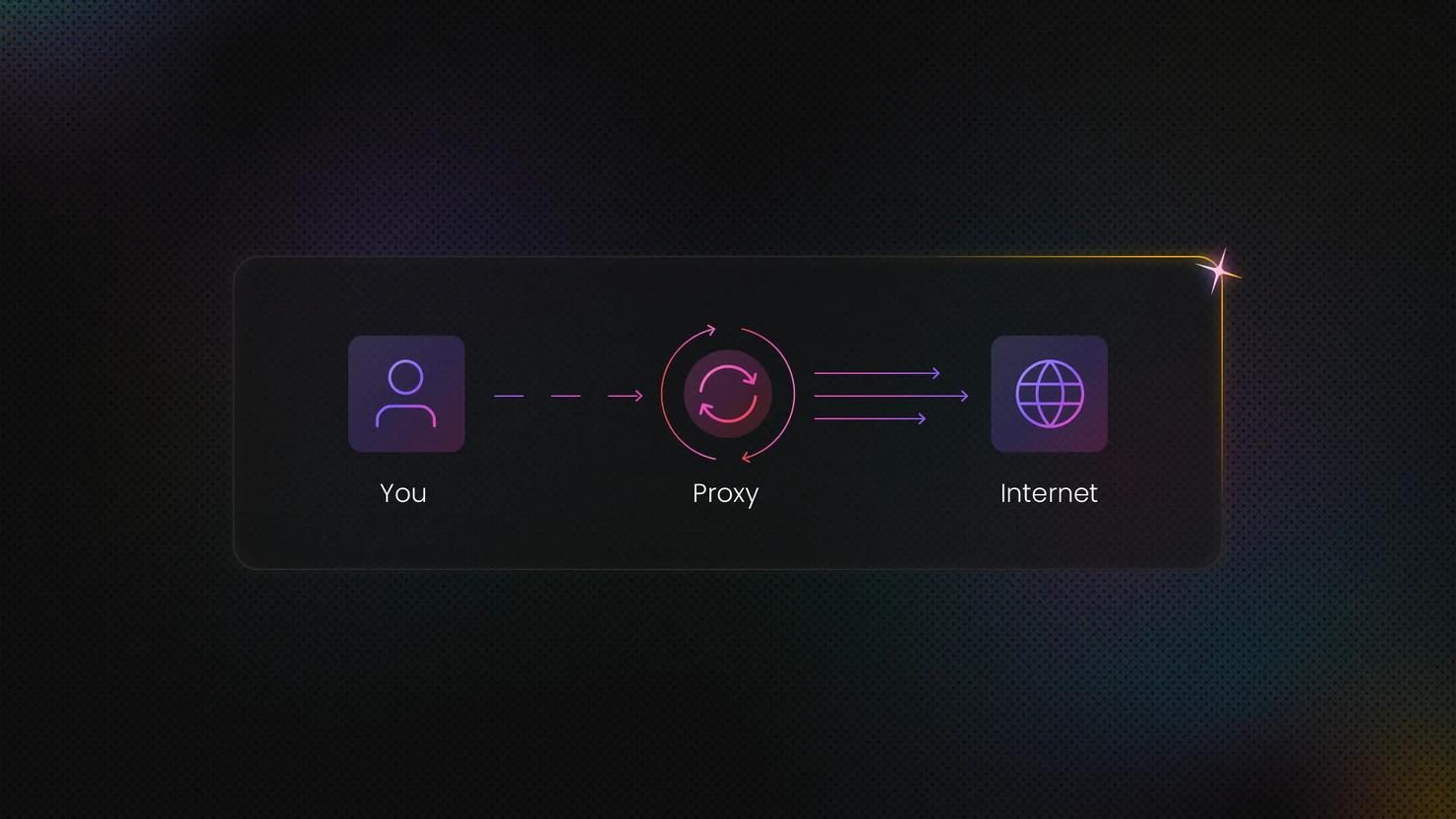Buy Mobile Proxies
Get past restrictions with rotating mobile proxies from real 3G, 4G, and 5G networks. Perfect for AI-scale data collection, mobile app testing, and multi-accounting – all backed by 10M+ IPs across 700+ mobile carriers.
10M+
ethically-sourced IPs
160+
global locations
#1
response time
700+
mobile carriers
99.76%
success rate
Reach top mobile proxy locations globally
Decodo gives you access to 10M+ ethically sourced mobile IPs across 160+ locations worldwide. Whether you need a single mobile proxy for testing, or thousands for automation, you get carrier-level precision and region-accurate results.
- Target specific cities, like New York, London, or Mumbai for localized campaigns, testing, or data gathering.
- Filter by mobile carrier or ASN for maximum targeting accuracy.
- Instantly switch between 160+ locations to access geo-restricted content anywhere in the world.
Find flexible mobile proxy plans
Choose a plan that fits your wants, needs, and use cases, starting from $2.25/GB.
With each plan you access
10M+ real mobile IPs from 700+ carriers
HTTP(S) & SOCKS5 support
160+ global locations
3G/4G/5G carrier-grade proxies
99.76% success rate
City-level targeting
Reliable access to mobile-only content
<0.5s avg. response time
24/7 tech support
14-day money-back
SSL Secure Payment
Your information is protected by 256-bit SSL
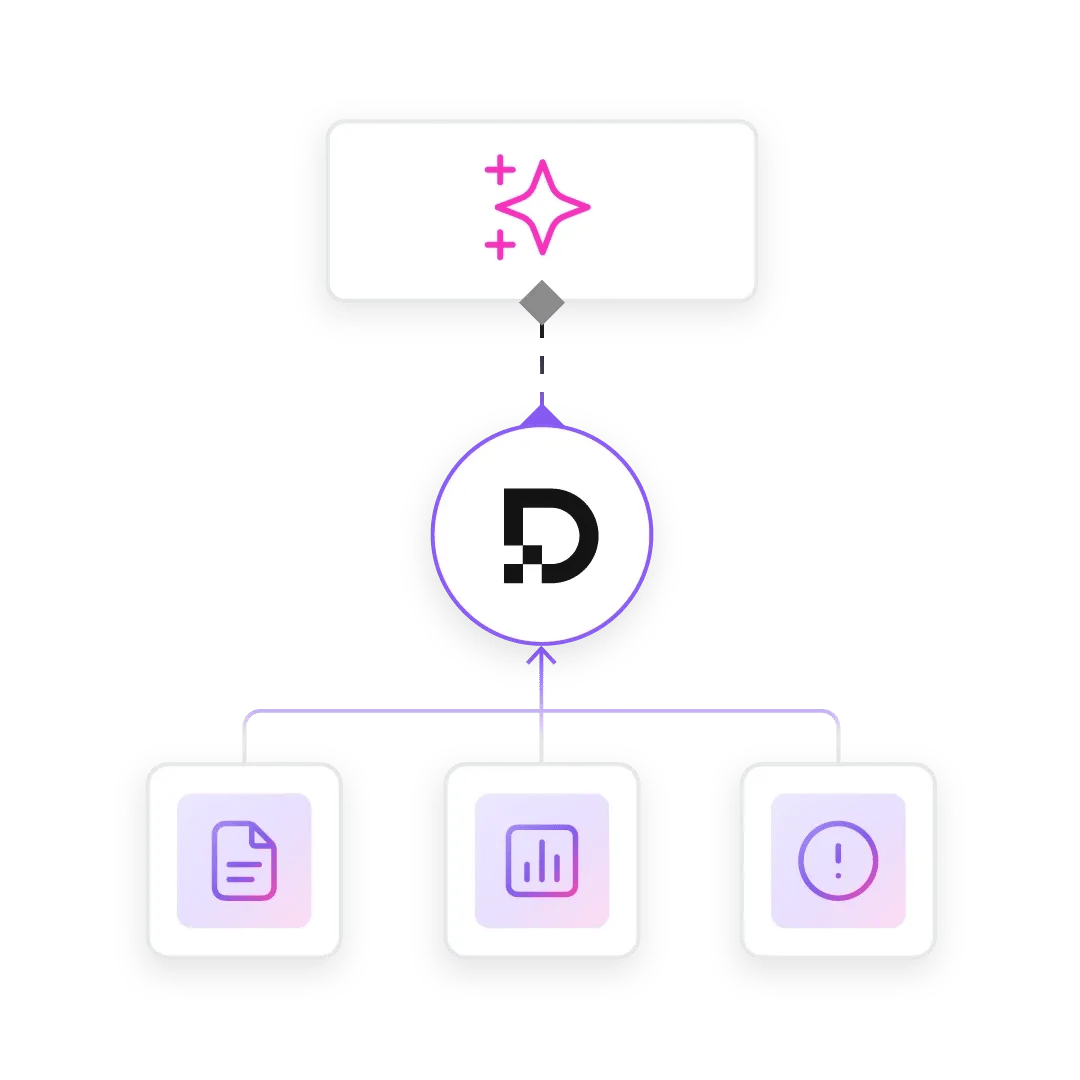
Build AI-ready pipelines with mobile proxies
Feed your AI workflows with premium data collected through authentic, carrier-grade IPs, built to mimic real mobile users and bypass even the toughest anti-bot measures. Pair them with our n8n node, MCP server, or AI Parser to automate your data pipelines:
- Genuine mobile footprints for AI agents
- City- and carrier-level targeting for diverse datasets
- Lower block risk thanks to real device IPs
- Works instantly with Requests, Playwright, Puppeteer, Python libraries, and more

Tap into the industry's most reliable mobile IPs
Launch data projects with precise, down to ZIP-level targeting, and get seamless access without CAPTCHAs or IP blocks. Gain a competitive edge with enterprise-grade reliability, budget-friendly plans, and 24/7 tech support.
Explore our products to find the best match
Compare proxies, features, and pricing with just a few clicks
Simplify how you manage proxies
Monitor live statistics
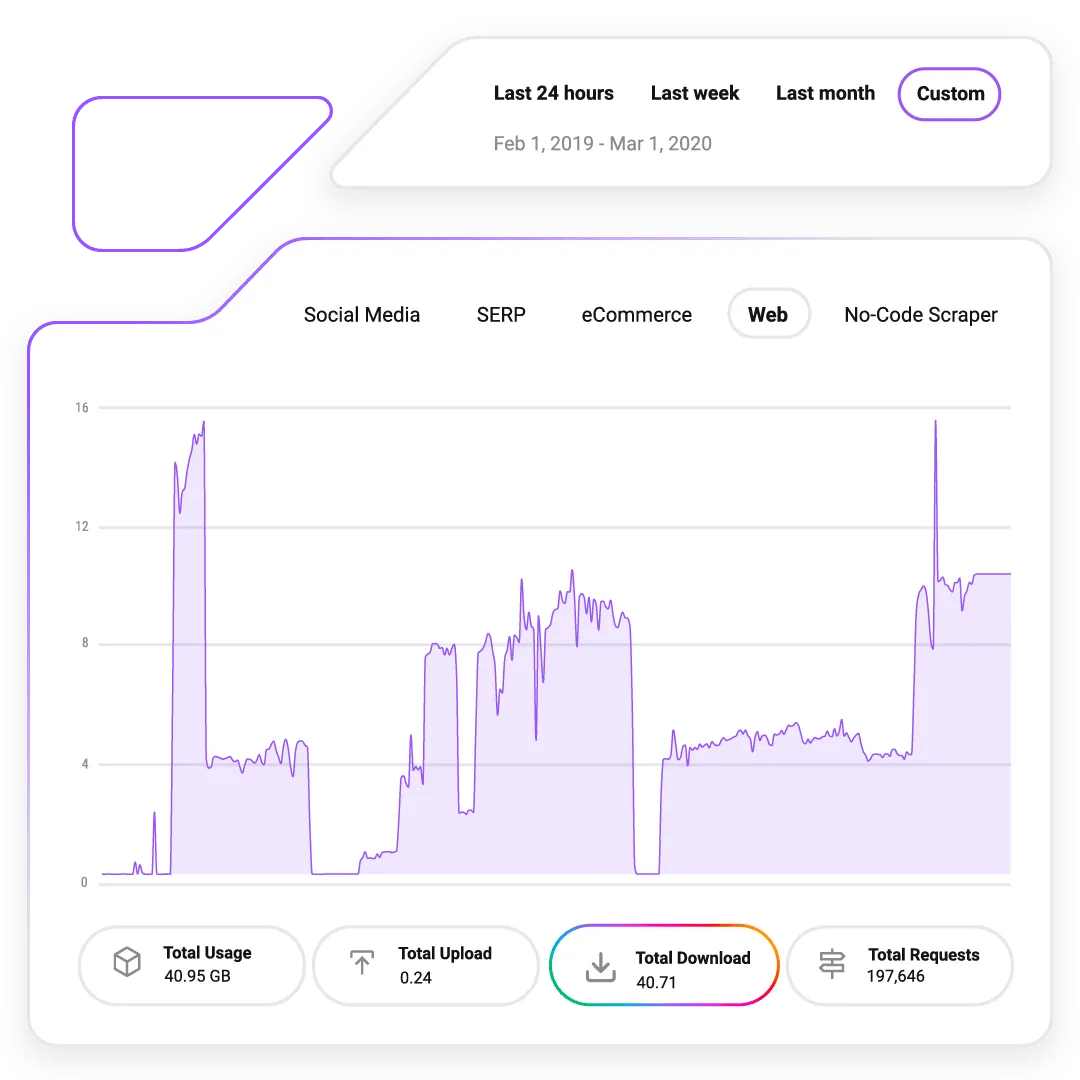
Track your top targets, usage stats, and traffic metrics in real time through our dashboard for faster, data-backed decisions.
No hassle with infrastructure

Collect data without managing IP rotation, handling errors and retries, or reconfiguring as you scale so you can focus on results.
Integrate with AI

Set up your workflows with AI integrations like Decodo's MCP server, n8n node, or LangChain agents.
Gain a competitive edge with our mobile proxies
Get global reach, seamless integration, and unmatched reliability with authentic mobile IPs that deliver the speed and anonymity you need.
Target locations worldwide
Access 10M+ mobile IPs from 700+ mobile carriers with city, ASN, and country-level targeting.
Integrate with your toolstack
Connect mobile proxies to the tools you already use with Python, Node.js, and other popular programming languages.
Reach 99.76% success rates
Use our mobile proxies to train AI models and automate workflows without CAPTCHAs, geo-restrictions, and IP blocks.
Pull data at mobile network speeds
Scrape with low latency across 3G, 4G LTE, and 5G networks without performance bottlenecks.
Rotate IPs automatically or stay sticky
Get a fresh IP with every request, or maintain the same session. Switch between modes without reconfiguring.
Stay anonymous with automatic IP rotation
Keep your operations undetectable with continuous IP rotation across 10M+ real mobile device IPs.
Choose between HTTP(S) and SOCKS5
Select HTTP(S) or SOCKS5 based on your technical requirements, without any extra configuration.
Route through ethically-sourced IPs
Collect data with real 3G, 4G, or 5G mobile IPs from consenting users, reducing detection risks while staying anonymous.
Set up proxies in minutes
Integrate mobile proxies with any popular language using our quick start guides and ready-to-use code examples.
Reach any target using our mobile proxies
Gain access to SERP, social media, and eCommerce targets for all your AI dataset, benchmarking, and competitive intelligence needs.
Amazon
Walmart
Simplify how you configure and integrate proxies
Connect Decodo proxies to the most popular third-party software out there.
Boost mobile proxy efficiency with these Decodo tools
Streamline how you collect data with our free, ready-to-use tools for managing proxies and profiles straight from your browser.
X Browser
Easily juggle multiple profiles without lifting a finger. Our X Browser will create unique fingerprints and do all the heavy lifting for you.
Chrome Proxy Extension
Easy-to-use, damn powerful. A proxy wonderland in your browser, accessible in 2 clicks. Free of charge.
Firefox Proxy Add-on
Simple to set up, even easier to use. The virtual world at your fingertips in 2 clicks with this freebie.
Explore top mobile proxy use cases
Get mobile proxies to enhance your data collection projects that demand authentic identities and bypassing advanced blocks.
AI and automation
Feed your AI models with clean, geo-targeted mobile data. Use rotating proxies to build training sets, validate models, or scale automated bots.
Multi-accounting
Create and manage multiple accounts on various platforms to grow your online presence without experiencing CAPTCHAs or IP blocks.
App development
Test apps and websites across different devices, OS, and locations to ensure the best user experience and highest conversion rates.
How to set up Decodo mobile proxies?
Check out our quick setup video and have your mobile proxies up and running in minutes.
Discover why users love Decodo
Over 1K reviews on Trustpilot and trusted by 135K+ clients and industry experts.
Attentive service
The professional expertise of the Decodo solution has significantly boosted our business growth while enhancing overall efficiency and effectiveness.
N
Novabeyond
Easy to get things done
Decodo provides great service with a simple setup and friendly support team.
R
RoiDynamic
A key to our work
Decodo enables us to develop and test applications in varied environments while supporting precise data collection for research and audience profiling.
C
Cybereg
Trusted by:
Discover our proxy product line
Buy proxies
Our proxy network is ideal for bypassing geo-restrictions, CAPTCHAs, and IP blocks. We offer vast ethically-sourced IP pools, wide location coverage, high success rates, and flexible pricing options.
Residential proxies
from $1.5/GB
Collect data with 115M+ ethically-sourced residential proxies across 195+ global locations, ensuring anonymity online and access to the data you need. Learn more
ISP Proxies
from $0.27/IP
Combine the authenticity of residential proxies and the stability and speed of datacenter ones with IPs from premium ASNs and sticky sessions. Learn more
Site Unblocker
from $0.95/1K req
Get real-time data with just a few simple clicks with dynamic rendering and advanced browser fingerprinting, powered by 125M+ IPs. Learn more
Datacenter proxies
from $0.02/IP
Run data scraping tasks using 500K+ shared and dedicated datacenter proxies worldwide with <0.3s average speed and 99.99% uptime. Learn more
Decodo blog
Get technical insights on mobile proxies and discover use cases for your next project on our blog.
Most recent
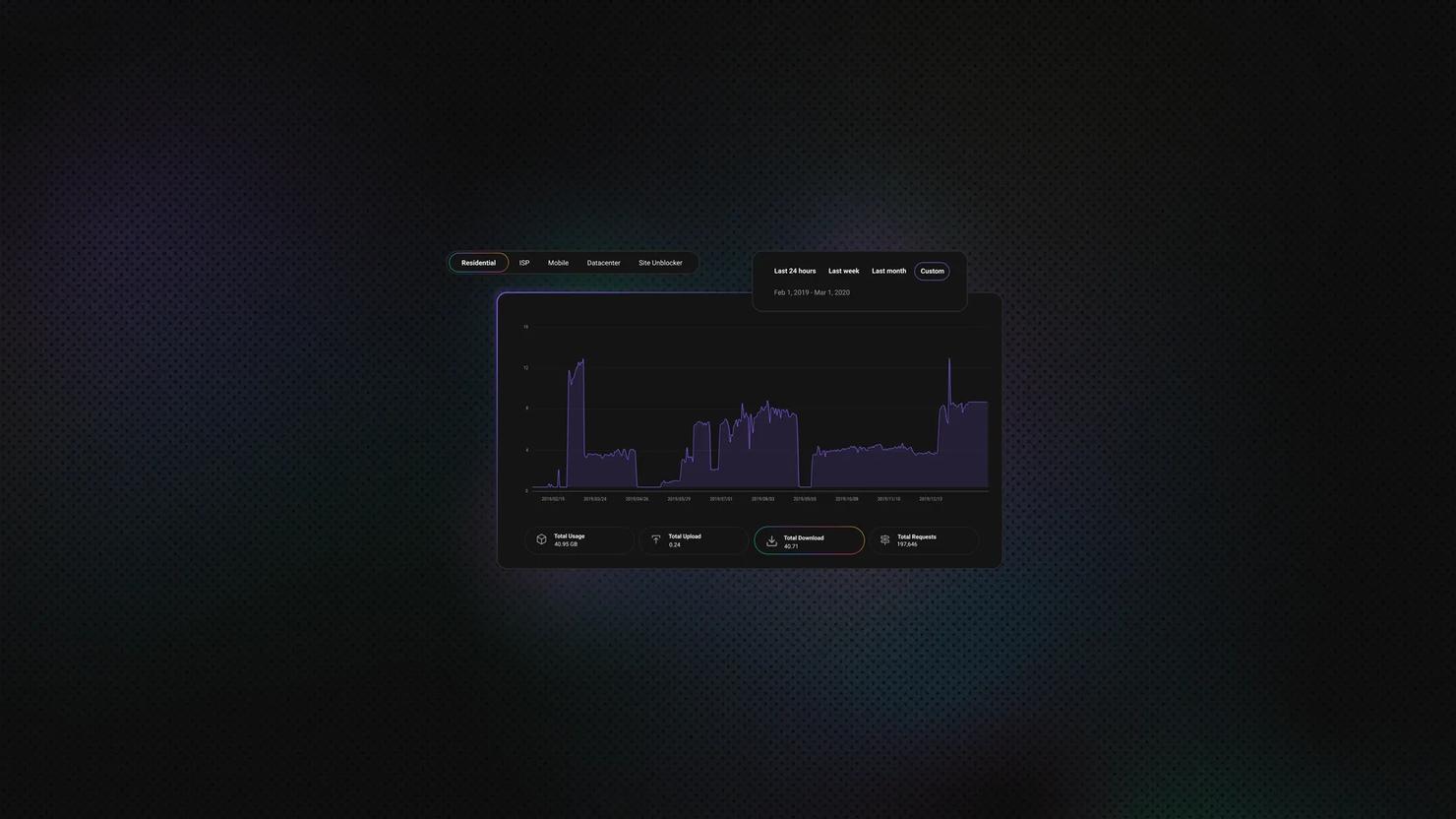
What Is a Proxy Server? How It Works, Types, and Use Cases
TL;DR: A proxy server acts as an intermediary between your device and the internet, masking your IP address and routing your requests through alternative IPs. Businesses use proxies to bypass geo-restrictions, avoid blocks and CAPTCHAs, scrape web data at scale, verify ads, monitor prices, and maintain online anonymity. With the proxy market projected to reach USD 3.12 billion by 2032, understanding which proxy type fits your needs can make the difference between seamless data collection and constant roadblocks.
Mykolas Juodis
Last updated: Feb 12, 2026
8 min read
Frequently asked questions
What is a mobile proxy?
A mobile proxy is an intermediary server that routes your traffic through real mobile device IPs from 3G/4G/5G carrier networks. Mobile proxies work well for bypassing strict anti-bot systems, accessing geo-restricted content, and scraping mobile-first sites that block datacenter IPs.
How do mobile proxies work?
Mobile proxies route your traffic through real mobile devices connected to 3G, 4G, or 5G carrier networks. Your requests appear to come from genuine mobile users rather than bots or datacenters, helping you bypass blocks and access protected sites.
Here's how it works:
- When you send a request, like visiting a site, scraping data, or making an API call, it goes to the mobile proxy network first.
- The proxy provider routes your request through a real mobile device active on the network. Each device has an authentic IP from a mobile carrier.
- The mobile device forwards your request using its carrier IP. To the target site, it looks like traffic from a regular mobile user, not a datacenter or bot.
- The destination website processes the request as normal mobile traffic, bypassing anti-bot systems that would flag suspicious IPs.
- The response travels back through the same mobile proxy to you, completing the cycle without exposing your original IP.
What are mobile proxies used for?
Mobile proxies are ideal for applications where trust and undetectability matter most, including:
- Bypassing geo-restrictions and accessing localized content
- Web scraping and large-scale data extraction
- Ad verification and fraud detection
- App testing and mobile QA
- Multi-accounting and automation
- eCommerce monitoring and brand protection
Are mobile proxies useful for AI workflows?
Yes, mobile proxies are very useful for AI workflows, including model training and automation, ensuring:
- Geo-diverse, real-world data that reflects different locations and carriers
- High-trust, human-like signals that reduce blocks and CAPTCHAs
- Stable access to mobile-first experiences (apps, mobile SERPs, mobile-only content)
What is a 4G mobile proxy?
A 4G mobile proxy is a proxy server that routes your traffic through 4G LTE mobile networks, using IP addresses assigned to real mobile devices by carriers. This makes requests appear to originate from real mobile devices, offering a high level of anonymity and credibility since mobile IPs are widely trusted.
Do you offer USA mobile proxies?
Yes, Decodo offers a large 3G/4G/5G mobile proxy pool in the US, plus 160+ other locations worldwide. You can target at country, city, and carrier level to test, scrape, or run campaigns with accurate US mobile footprints.
Power Your Data Collection Projects with Mobile Proxies
Access 10M+ 3G, 4G, and 5G mobile IPs from 700+ carriers across 160+ locations worldwide.
14-day money-back option
